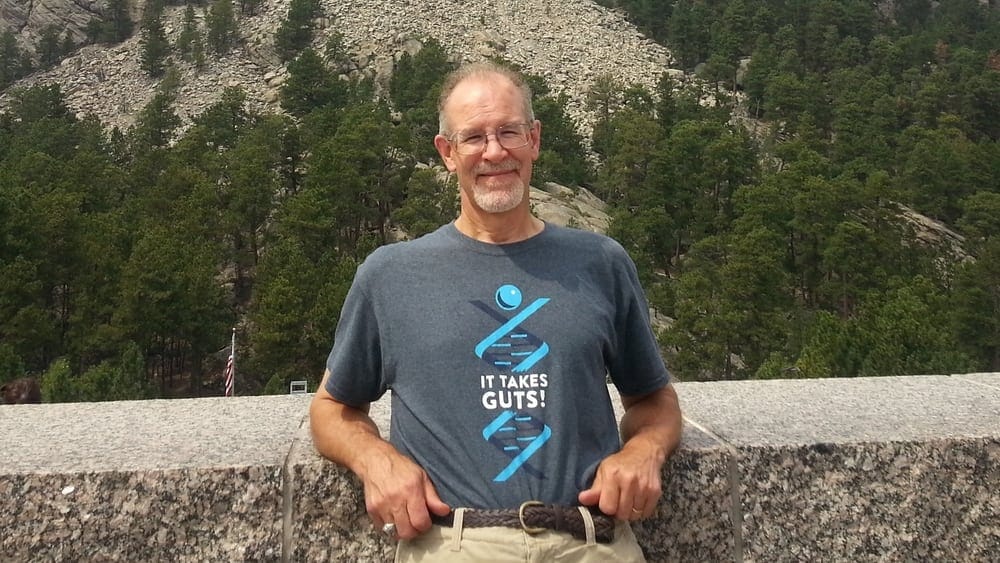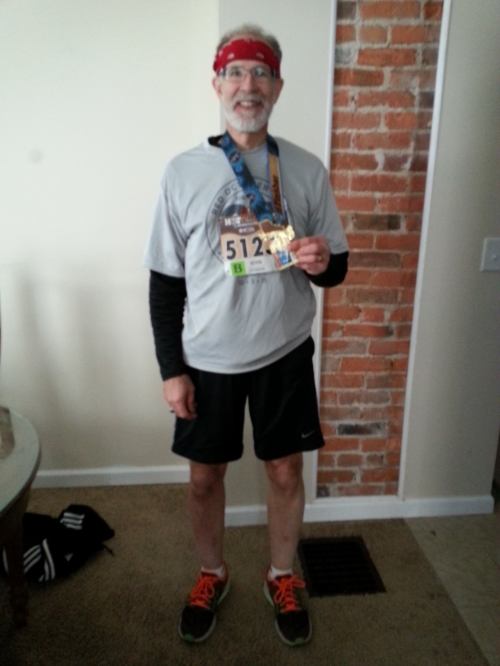
This article is part of a series created to highlight rare hereditary cancer syndromes. Here’s Kevin’s story of Familial Adenomatous Polyposis (FAP).
Genetic Counseling Note: Familial Adenomatous Polyposis (FAP) is an hereditary cancer syndrome that results in the development of multiple polyps in the GI tract. FAP is often caused by a mutation in the APC gene.
People with Classic FAP develop hundreds or thousands of adenomatous polyps in their GI tracts, mainly in their large intestine (colon). Polyps often begin to develop in childhood and become numerous by the teenage years. If left untreated, the chance that a polyp will progress into cancer by age 40 approaches 100%. Individuals with FAP are offered colonoscopies to screen for colon polyps in childhood and a colectomy (removal of the colon) is often recommended if/when polyps become too numerous for surveillance. This surgery significantly reduces the chance that a person with FAP will ever develop colon cancer.
If a person carries a mutation in the APC gene, each of his/her children has a 50% chance to carry the mutation. Importantly, about half of individuals with APC mutations have ‘de novo’ mutations, meaning that the mutation is new in that person. For this reason many people diagnosed with FAP have no family history of colon polyps or cancer.
Some people have a form of this syndrome called Attenuated FAP that involves fewer polyps at later ages. FAP can also include findings outside of the GI tract, such as an eye condition abbreviated as CHRPE, thyroid cancer, osteomas, fibroids, desmoid tumors and epidermoid cysts.

Tell us a little bit about yourself
I am a social, healthy 58 year-old who loves being outdoors. While I was thrilled to skydive once, I mostly enjoy keeping my feet on the ground and am an active runner. My daughter is a junior in college, and my wife, of nearly 34 years, and I are enormously proud of her. Previously, I worked as a social worker for many years.
FAP and your family
Our family story beings with my paternal grandmother who died from colon cancer at age 28. She was adopted into the family and we have no information about her biological relatives. She died when my father was 2 and his brother was 6. About 35 years later, my paternal uncle was diagnosed with and died from colon cancer. His doctors suggested that my father have a colonoscopy. He was diagnosed with hundreds of colon polyps and had his colon removed (colectomy) at age 39. Based on his family history, my father only expected to live a short time into his 40s. We are so happy and blessed that we will be celebrating his 90th birthday this year!
FAP and your generation
Growing up in a family of five siblings, we were all aware that my father had surgery; however, it wasn’t until my eldest brother was diagnosed with colon polyps at age 16 that we really understood that we were at risk for FAP. That brother had a colectomy shortly afterward when I was 10 years old. Three years later my father took me for my first colonoscopy. Although they gave me medicine to be comfortable during the screening, I was alert enough to hear the doctor say “yup, there they are, there are the polyps.” I was devastated and I was scared about what this would mean for me. My colectomy and ileostomy happened shortly afterward at age 14. To say that my teenage years were hard would be an understatement. The years before my surgery were tough as a young awkward teenager trying to find my way, but they were even more difficult after my surgery. While FAP was an open topic at home, when I was out or at school I tried my hardest to hide it, which resulted in my feeling of deep isolation. Later, my three younger brothers were also diagnosed with FAP and my family became my support group.
Were there any turning points for you?
Over time I decided that FAP would not define my life but would instead be just one road sign along my path in life. My family learned about the significance of FAP from previous generations and knew to take it seriously. We were screened early and took the necessary steps to reduce our cancer risks through surgery. As with many medical conditions, an early diagnosis for someone with FAP is critical and I am truly grateful for it.
A second turning point happened when I met others with FAP at a symposium hosted by the University of Michigan for individuals with an inherited risk for colon cancer. The support I received and the connections I made with others were overwhelmingly positive. This inspired me to set into motion the beginnings for the first Support and Education group for others with FAP and Lynch Syndrome. We are so grateful to have the support of The Hereditary Colon Cancer Foundation, FAP and Lynch Syndrome Facebook sites, the Cancer Support Community of Greater Ann Arbor as well as the Cancer Genetics department through the University of Michigan Medical System. I have found them to be wonderful and supportive communities. Hearing other people’s stories, learning about their experiences and connecting with them has lead to many positive ripple effects in my life and has really turned things around for me.
What advice do you have for others?
Connecting with others who have a similar diagnosis was key for me and I encourage anyone with a new diagnosis to connect with others as soon as possible. Technology has given us so many resources to connect, get involved and tell our story which, in-turn, will empower others. We have the opportunity to live well and improve our own quality of lives through conversation. I believe that it is up to the people with a particular condition, like FAP, to continue the conversation, ask questions and push the field forward.


